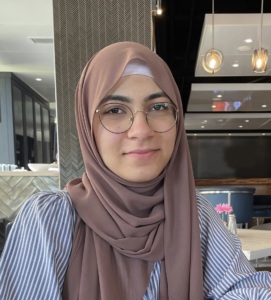Fareeha Chaudhry
“Through the RADical Health program, I’ve found that it’s much easier (and less daunting) to start up conversations with peers, classmates and even new students I’ve just met.”

Wayne State University
Major: Psychology
Minor: Public Health
What drew you to your major?
Psychology is such a pivotal part of science and art alike, so I wanted to study something that was not just fascinating to learn, but also practical in and out of school. We are all so alike yet so vastly different, so it’s been really interesting to learn what basic emotions and neurological processes we all share, as well as what changes between us as a function of our unique genetics and environment.
How has RADical Health influenced how you connect with others on campus?
Through the RADical Health program, I’ve found that it’s much easier (and less daunting) to start up conversations with peers, classmates and even new students I’ve just met. Each week has taught me that as young adults, we each share similar struggles and are equally eager to transcend those struggles to be stronger, healthier individuals. That innate connection has influenced me to approach anyone I talk to with less anxiety, since I know that we’re all likely in the same boat as we learn to navigate college and this new life period.
How do you think what you’ve learned in RADical Health will help you in future academic or professional settings?
I hope to work with adolescents and young adults as a psychologist in my future career, so not only are the topics in RADical Health prevalent to my life, but are also pertinent and developmentally essential skills that people at these ages need to learn. I can use the program’s themes, such as the importance of boundaries and priority-setting, to further encourage these populations to engage in deep reflection about how these concepts play a role in their life, which would allow me to be an effective and attentive psychologist.
Can you share a specific situation where skills from RADical Health helped you manage stress or overcome a challenge?
I had a difficult group project in one of my public health classes, where it was hard to communicate with a group member about when we wanted to have the parts of our project done. It was initially challenging to navigate, but I was lucky to have my RADical Health group to talk to about the stress of finals and task prioritization, as well as to do the active listening activity with.
These concepts encouraged me to take a step back from the situation, and I used the skills I learned to directly talk with and intently listen to that group member about each of our individual priorities during finals season and how we both wanted to do well on the project.
That was the turning point of when we finally became effective communicators and collaborators, and it definitely paid off – we finished the project on time and got a great grade!
What advice would you give to your freshman self?
Stick around after more. Whether it’s after class or a club meeting, you gain so many special connections by choosing to converse a little more with faculty and your peers. You may think you have “nothing important” to add on, but a question you’d like clarification on or a compliment about something that stood out to you makes all the difference in starting a conversation.
Having this advice in my freshmen year would have really broken up my rote routine of just attending class and going home. Now, I’ve made so many new friends and connections just by “sticking around more” after events in our psychology department, and it has truly changed my college experience!